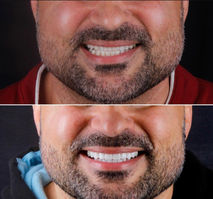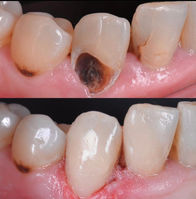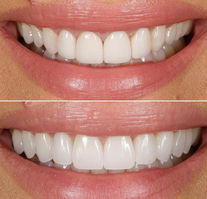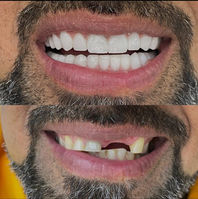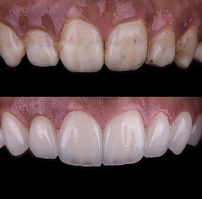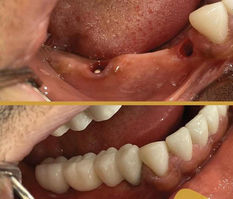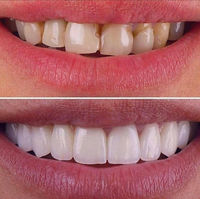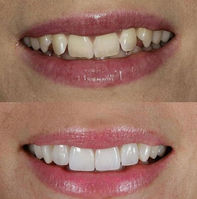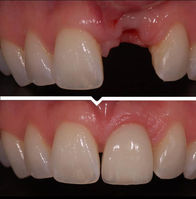Veneers in Turkey
The Full Guide to Dental Veneers in Turkey Istanbul
Dental veneers are a popular cosmetic dental treatment that can transform the appearance of teeth, enhancing the beauty and symmetry of your smile. This article will provide an in-depth explanation of what dental veneers are, the process of getting them, advantages and disadvantages, aftercare, and answers to frequently asked questions.

Table of Contents: What are Dental Veneers? What types of Veneer are there? The Process of Getting Dental Veneers Advantages of Dental Veneers Disadvantages of Dental Veneers Aftercare for Dental Veneers

What are Dental Veneers?
Dental veneers are thin, custom-made shells that are placed on the front surface of teeth to improve their appearance. They are typically made of porcelain or composite resin and can be used to address various cosmetic concerns such as chipped, discolored, misaligned, or unevenly spaced teeth.
What types of Veneer are there?
porcelain and composite.
Porcelain veneers:
are more durable, stain-resistant, and have a more natural appearance compared to composite veneers.
Composite veneers:
on the other hand, are more affordable and can be placed in a single dental visit.

The Process of Getting Dental Veneers
The process of getting dental veneers usually involves three to four appointments with your dentist. During the initial consultation and examination, your dentist will evaluate the condition of your teeth, discuss your goals, and determine if you are a suitable candidate for veneers.
If you are a candidate, your dentist will prepare your teeth by removing a small amount of enamel from the front surface of the teeth. This will allow the veneers to fit properly and create a natural appearance.
Next, your dentist will take impressions of your teeth to create the veneers. The impressions will be sent to a dental laboratory, where the veneers will be custom-made to fit your teeth.
Once the veneers are ready, your dentist will fit and bond them to your teeth using a special dental adhesive. This process may require multiple adjustments to ensure that the veneers fit properly and look natural.

Advantages of Dental Veneers
Dental veneers offer a range of benefits, including:
Improved appearance of teeth:
Veneers can enhance the color, shape, and size of your teeth, resulting in a more attractive smile.
Increased self-confidence:
Many people feel self-conscious about their teeth, and veneers can help boost self-esteem and confidence.
Durability and longevity:
Porcelain veneers can last up to 10-15 years with proper care, while composite veneers can last up to 5-7 years.

Disadvantages of Dental Veneers
Despite their benefits, there are a few potential drawbacks to consider:
Cost:
Veneers are not typically covered by insurance, and the cost can range from $800 to $2,500 per tooth in England and From 200 to 500 $ in Turkey.
Irreversibility of the procedure:
Once the enamel is removed, it cannot be replaced. This means that veneers are a permanent alteration to the teeth.
Potential for tooth sensitivity:
After the procedure, you may experience increased tooth sensitivity to hot and cold temperatures.
Aftercare for Dental Veneers
Maintaining proper oral hygiene is essential for the longevity of dental veneers. This includes brushing and flossing regularly and avoiding hard, crunchy, or sticky foods. It is also important to visit your dentist for regular checkups to monitor the health of your teeth and veneers.
Smile Makeover in Turkey Before and After Cases Gallery:
صور قبل وبعد
Veneers in Turkey
اسئلة وأجوبة
Do Turkish dentists speak English?
Yes, many Turkish dentists are proficient in English and can communicate effectively with international patients. Turkey is a popular destination for dental tourism, attracting patients from around the world. Dental clinics catering to international patients often have dentists and staff members who are fluent in English to ensure effective communication and provide a comfortable experience for English-speaking patients.
In major cities and popular tourist areas, you are more likely to find dental professionals who speak English fluently. However, it's always a good idea to inquire with the dental clinic beforehand to confirm their language capabilities. You can contact the clinic directly or visit their website to check if they offer English-speaking services or have translators available.
Additionally, some dental clinics in Turkey employ multilingual staff or have interpreters who can assist with translation if needed. Communication and language barriers are typically addressed to provide a smooth experience for international patients seeking dental treatments in Turkey.
What type of dental treatments are available in Turkey?
Routine dental check-ups and cleanings: Regular examinations and professional cleanings to maintain oral health and prevent dental problems.
Tooth fillings: Restoration of cavities or damaged teeth using materials like composite resin or amalgam.
Dental crowns and bridges: Custom-made dental caps (crowns) to restore damaged teeth, or bridges to replace missing teeth.
Dental implants: Surgical placement of artificial tooth roots (implants) to support dental prosthetics like crowns, bridges, or dentures.
Root canal treatment: Removal of infected or damaged pulp within the tooth, followed by cleaning, disinfection, and sealing.
Teeth whitening: Cosmetic procedures to lighten the shade of discolored or stained teeth, enhancing their appearance.
Orthodontic treatments: Correction of misaligned teeth and jaw alignment using braces, clear aligners (such as Invisalign), or other orthodontic appliances.
Dental veneers: Thin, custom-made shells bonded to the front surface of teeth to improve their appearance by correcting issues like discoloration, chips, or gaps.
Dentures: Partial or complete removable prosthetic devices used to replace missing teeth and restore oral function.
Oral surgery: Various surgical procedures, including wisdom tooth extraction, dental implant placement, bone grafting, and gum surgery.
Periodontal (gum) treatments: Diagnosis and treatment of gum diseases, including scaling and root planing, gum surgery, and periodontal maintenance.
Cosmetic dentistry: Smile makeovers, including treatments like dental bonding, gum contouring, enamel shaping, and full-mouth rehabilitation.
These are just a few examples of the dental treatments available in Turkey. The country has a well-developed dental sector that caters to both local and international patients, offering advanced treatments in a variety of dental specialties. It's recommended to consult with dental clinics in Turkey to discuss your specific dental needs and explore the available treatment options.
How long will the dental treatments take?
The duration of dental treatments in Turkey can vary depending on the type of treatment, the complexity of the procedure, and the individual patient's case. Here are some approximate timeframes for common dental treatments:
Routine check-up and cleaning: Usually takes around 30 minutes to 1 hour.
Tooth filling: Generally completed within 30 minutes to 1 hour per tooth, depending on the size and location of the cavity.
Dental crown or bridge: Typically requires multiple visits over a period of 2 to 3 weeks. The initial visit involves tooth preparation and impressions, while the final visit is for the placement of the crown or bridge.
Dental implant: The treatment can span several months. It involves multiple stages, including implant placement, healing period (osseointegration), and the placement of the dental prosthesis (crown, bridge, or denture) on top of the implant.
Root canal treatment: The duration can vary based on the complexity and the number of root canals involved. It usually takes 1 to 3 visits, with each visit lasting approximately 1 to 2 hours.
Teeth whitening: In-office teeth whitening treatments typically take around 1 to 2 hours to complete a single session. Multiple sessions may be required to achieve the desired results.
Orthodontic treatments (braces or clear aligners): The duration varies depending on the severity of misalignment and the chosen orthodontic method. Treatment can range from several months to a few years, with regular adjustments and follow-up visits throughout the process.
It's important to note that these timeframes are estimates and can vary depending on individual factors. The treating dentist will provide a more accurate timeline after evaluating your specific case during the initial consultation. They will outline the treatment plan and discuss the anticipated duration of each phase of the treatment.
It's recommended to plan your trip to Turkey accordingly, considering the duration of the treatment and any necessary follow-up visits. Dental clinics in Turkey are accustomed to catering to international patients and can often accommodate scheduling to optimize your time and minimize the number of trips required.
How do I find a reputable dental clinic in Turkey?
Research and gather information about dental clinics.
Seek recommendations from friends, family, or colleagues.
Check online directories and platforms for clinic listings and reviews.
Verify credentials and accreditation of the clinics.
Consult with the shortlisted clinics and ask about services, pricing, etc.
Visit clinic websites to gather more information.
Consider the location and accessibility of the clinic.
Look for patient testimonials and before-after pictures.
Consult with your regular dentist for recommendations or advice.
Trust your instincts and choose a clinic that makes you feel comfortable.
By following these steps, you can find a reputable dental clinic in Turkey for your needs.
What is the success rate of the dental treatments in Turkey?
The success rate of dental treatments in Turkey can vary depending on the specific treatment, the skill and experience of the dental professional, and individual factors such as oral health and patient compliance with post-treatment care. However, dental treatments in Turkey generally have high success rates.
Is it safe to travel to Turkey for dental treatments?
Traveling to Turkey for dental treatments can be safe if you take appropriate precautions and choose a reputable dental clinic. Turkey is known for its advanced dental facilities, skilled dentists, and affordable prices, attracting a significant number of international patients seeking dental care.
However, as with any medical travel, it's essential to consider the following factors to ensure a safe experience:
Research and choose a reputable dental clinic: Look for well-established clinics with positive patient reviews and a track record of delivering quality care. Consider factors such as the clinic's credentials, expertise of the dental professionals, and their adherence to international standards and hygiene practices.
Consult with your regular dentist: Before making any travel arrangements, consult with your regular dentist at home. They can provide insights, recommendations, and guidance regarding your specific dental needs and potential treatments in Turkey.
Verify the credentials of the dental professionals: Ensure that the dentists and staff at the clinic are licensed and qualified to perform the treatments you require. You can inquire about their qualifications, experience, and affiliations with dental associations.
Take necessary precautions: Follow standard travel precautions, such as researching the local area, understanding the healthcare system, and familiarizing yourself with emergency contact information. It's also advisable to have travel insurance that covers any unexpected medical or dental expenses.
How much will the dental treatments in Turkey cost?
The cost of dental treatments in Turkey can vary depending on several factors, including the type of treatment, the complexity of the procedure, the location of the clinic, and the expertise of the dental professional. Generally, dental treatments in Turkey tend to be more affordable compared to many other countries. However, it's important to note that specific prices can only be provided by dental clinics after a thorough examination and evaluation of your individual case.
To get an idea of the approximate costs, here are some common dental treatments and their estimated price ranges in Turkey:
Routine check-up and cleaning: $20 to $60
Tooth filling: $30 to $80
Teeth whitening: $150 to $400
Dental crown: $200 to $800
Dental implant: $600 to $1,500 per implant
Root canal treatment: $100 to $400 per tooth
Orthodontic treatment (braces): $1,500 to $3,500 (depending on the type and duration)
Please note that these are rough estimates, and actual prices may vary. It's recommended to contact dental clinics in Turkey directly for accurate pricing information. They can provide you with a personalized treatment plan and cost estimate based on your specific dental needs.
Additionally, it's important to consider other factors such as travel expenses, accommodation, and any pre- or post-treatment care that may add to the overall cost. It's advisable to thoroughly research and consult with multiple clinics to compare prices and services before making a decision.
What is the level of aftercare provided by the dental clinic?
The level of aftercare provided by dental clinics in Turkey can vary depending on the clinic and the specific treatment received. However, reputable dental clinics in Turkey generally prioritize patient care and provide comprehensive aftercare instructions and support to ensure optimal healing and long-term success of the treatment.
Aftercare typically includes:
Post-treatment instructions: The dental clinic will provide detailed instructions on how to care for your oral health after the treatment. This may include information on proper oral hygiene practices, dietary restrictions, and any specific precautions related to the treatment received.
Medication and pain management: If necessary, the clinic may prescribe medications to manage pain or discomfort following the treatment. They will provide instructions on how to take the medication and any potential side effects to watch for.
Follow-up appointments: The clinic will schedule follow-up appointments to monitor your progress, assess the healing process, and make any necessary adjustments to your treatment plan. These appointments are crucial for the dentist to ensure that the treatment is successful and to address any concerns or complications that may arise.
Communication and support: Reputable dental clinics in Turkey maintain open lines of communication with their patients. They are responsive to inquiries or concerns that you may have after the treatment and provide the necessary support and guidance throughout the healing process.
Warranty or guarantee: Some dental clinics offer warranties or guarantees for certain treatments, such as dental implants or dental restorations. These warranties provide coverage in case of any issues or failures related to the treatment within a specified period. It's important to inquire about any warranty or guarantee policies before undergoing treatment.
It's advisable to discuss the aftercare protocol with your dental clinic during the initial consultation. They will explain the specific aftercare measures for your treatment and answer any questions you may have. By following the provided aftercare instructions and attending scheduled follow-up appointments, you can ensure proper healing and maximize the success of your dental treatment.




